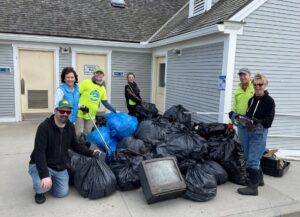BOSTON (AP) — A bill aimed at curbing the state’s opioid addiction is now law.
Republican Gov. Charlie Baker signed the bill Monday morning at the Statehouse, surrounded by members of the state Legislature, addiction and recovery experts, and family members impacted by the crisis.
Baker pushed for the legislation as Massachusetts struggles to stem a growing tide of opioid deaths, including overdoses from heroin.
“I sign it happily and with great anticipation about the tools the Legislature is providing to the administration,” Baker said during the signing ceremony.
The bill will limit initial painkiller prescriptions to a seven-day supply and set an evaluation requirement within 24 hours for overdose victims seeking help at hospital emergency rooms.
“While there is still much work to be done, our administration is thankful for the legislature’s effort to pass this bill and looks forward to working with the Attorney General and our mayors to bend the trend and support those who have fallen victim to this horrific public health epidemic,” Baker said.
The legislation also gives patients the ability to fill only part of their painkiller prescriptions at a time.
“Today, we take another step forward by passing landmark legislation that will help the individuals and communities affected by the deadly opioid and heroin epidemic,; said Lt. Governor Karyn Polito. We are grateful for the legislature’s progress and for the partnership of Attorney General Healey, our mayors and several others as we continue pursuing aggressive reforms to combat this crisis from the Berkshires to the Cape.”
Massachusetts Attorney General Maura Healey, who appeared to become emotional while speaking about the bill, said the drug crisis needs to be addressed.
“This landmark legislation is the result of broad support and partnership from the many stakeholders we have worked with over the last year to tackle the very real struggle people in Massachusetts and across the country are dealing with right now when it comes to prescription painkillers and heroin. This bill will not only change how we as a society treat opioid painkillers, it will provide the treatment, education and prevention we so desperately need,” said Attorney General Maura Healey.
The bill would also require schools to verbally screen students for potential drug abuse. Parents could opt their child out of the screenings.
Janice McGrory of Harwich, who lost her daughter, Liz, to a heroin overdose in 2011, said her daughter’s addiction like many others started with prescription painkillers.
Senate President Stan Rosenberg said what used to be seen as a crime is now understood to be a disease.
Several measures were passed to empower individuals and update current prevention efforts. Patients will receive access to non-opiate directive forms and the option of partially filling opioid prescriptions in consultation with doctors and pharmacists.
Schools must annually conduct verbal substance misuse screenings in two grade levels and collaborate with the Departments of Elementary and Second Education (DESE) and Public Health (DPH) around effective addiction education policies.
To reduce the prevalence of unused medication, manufacturers of controlled substances in Massachusetts must participate in either a drug stewardship program or an alternative plan as determined by DPH.
This bill strengthens access to insurers and the bed-finder tool website; requiring patients receive information on FDA-approved medication-assisted therapies after being discharged from a substance use treatment program; and ensuring civil-liability protection for individuals who administer Narcan.
Governor Baker also recently signed a fentanyl trafficking bill, authored by Attorney General Maura Healey, making trafficking in more than 10 grams of fentanyl a crime, punishable by up to 20 years in prison.
In addition to legislative action, the Baker-Polito Administration has implemented numerous initiatives from Governor Baker’s action plan announced in June, completing 26 initiatives and currently implementing another 23.
The administration has allocated more than $250 million toward the opioid epidemic for substance use disorders, education, prevention and treatment, increased bulk purchasing of Narcan in municipalities by offering Narcan at a discount to our first responders and changed reporting requirements for the Prescription Monitoring Program from 7 days to 24 hours.
More than two hundred substance use treatment beds have been opened throughout the Commonwealth.
The opioid epidemic continues to impact every community in Massachusetts. According to the most recent data, it is estimated that there were nearly 1,200 unintentional and undetermined opioid deaths in 2014.
According to the governor’s office, the estimated rate of 17.4 deaths per 100,000 residents for 2014 is the highest ever for unintentional opioid overdoses and represents a 228% increase from the rate of 5.3 deaths per 100,000 residents in 2000.
And the trend isn’t slowing.
Preliminary data estimations show, there were over 1,100 opioid deaths between January and September of 2015.
The Massachusetts House and Senate unanimously approved the bill last week.

























Speak Your Mind